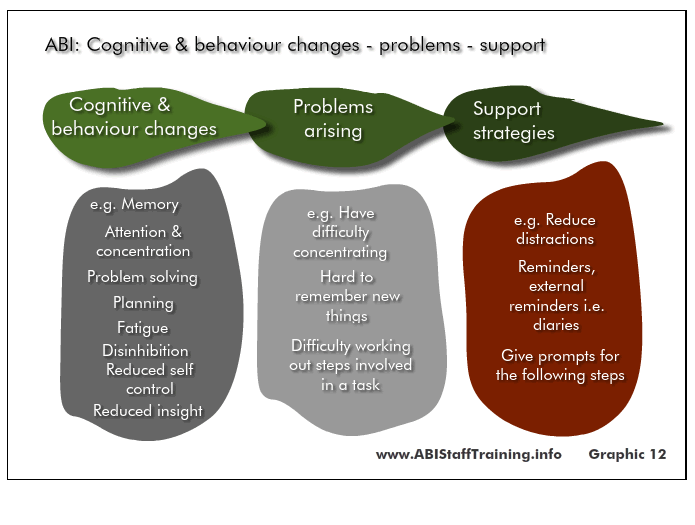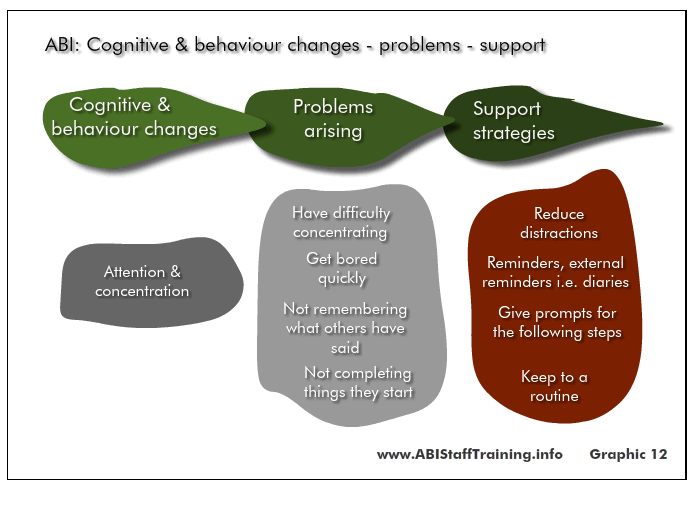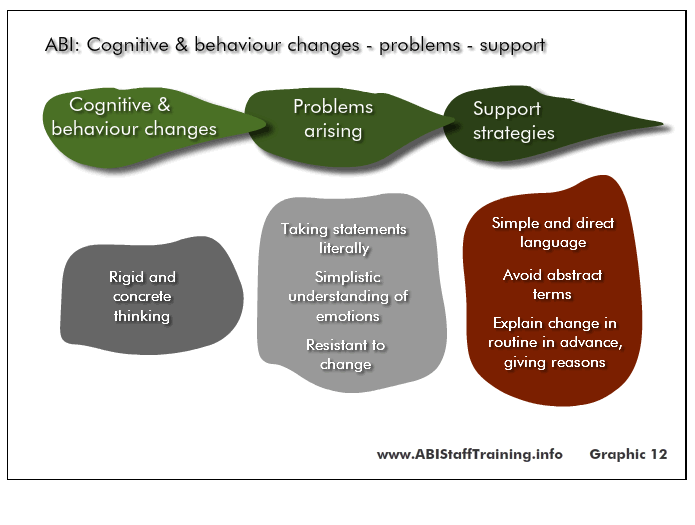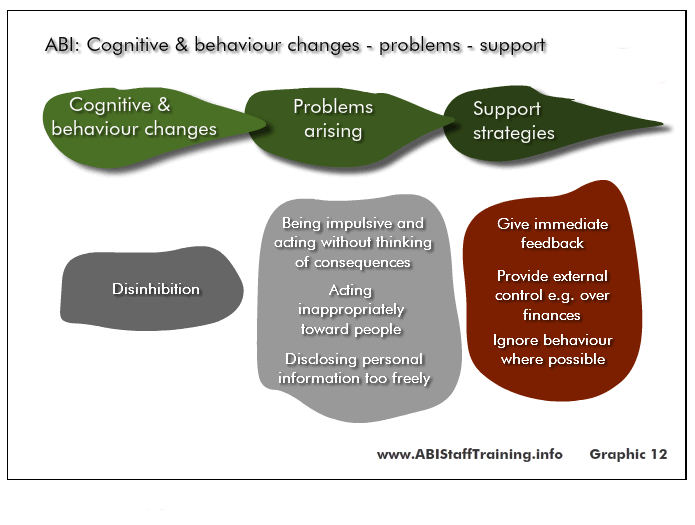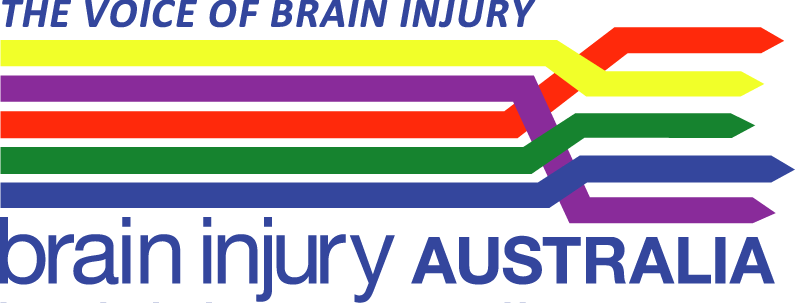- MODULE 2: Working with ABI
- Introduction
- Take the Pre-test
- A. Uniquely building independence
- a) Unique
- b) Injury-Effect-Behaviour
- c) Frontal lobe proxy
- d) Change happens
in the day to day - e) A life span view
- f) Person centred, Goal directed
- B. Through emotions and relationships
- g) Person with ABI
- h) Family members
- i) Grief and loss
- j) Support workers
- k) Managers and Team leaders
- l) Case managers
- m) Professional boundaries
- C. With services
- n) Pathways
- o) Part of a team
- p) The services network
- D. Principles and standards
- q) Principles and standards
- E. Integration
- r) Practice tools
- s) Case study
- t) Further learning
- Take the Post-test
b) Injury - effect - behaviour - behaviour support
- i) Introduction
- ii) Gabby: before
and now: Video - iii) Cognitive changes:
Graphic - iv) Impairments:
Strategies - v) Case study
Questions
i) Injury - effect - behaviour - strategies
People with an ABI have a brain injury.
The injury has an effect on the working of the brain.
The working of their brain affects their behaviour.
People working with people with an ABI have to manage behaviours.
Rules of thumb
1. Understand:
- What is the injury?
- What is the effect?
- How is the effect expressed in behaviour?
- What are strategies for managing the behaviours?
2. Get to know the person
3. Get to know what strategies work for this person.
One worker said:
As a result of his accident he is left with his residual left sided weakness. He has chronic pain in his left knee and that's with – they have tried to address that with surgery but it is more to do with his brain injury as opposed to actually his knee. Obviously his speech is still affected and his behaviour. His behaviour is the biggest element. He can be quite oppositional, he can be threatening. We have had occasions where we have had to call the police out because he has threatened to hurt people. He just doesn't understand the consequences of those behaviours and he just thinks about the immediate gratification of needs.
ii) Clip 5. Gabby : Before and After (2min 30 sec)
Gabby describing how she was before the accident and how she is now .
What are some of the before and after differences for Gabby?
Lot more relaxed with the future. I
don't feel as stressed about am I going in the right directions.
Now focussed on small things. The small things are a big thing - switch off the light, open a cupboard door.
Don't feel a sense of loss - I think that is part of the brain injury.
Friends find not having a sense of loss strange to comprehend.
Learnt patience.
Mobility issues.
iii) Cognitive and behavioural changes - problems arising - support strategies
Screen 1 is an overview. Screens 2, 3 and 4 have specific examples.
SLIDES:
To pause: Hover mouse over slide. To continue: move mouse off slide.
To go to a specific slide: Click on slide numbers below.
iv) Strategies for cognitive impairments
These are typical cognitive impairments, problems arising and management strategies.
There are also strategies for other changes e.g. mobility, communication, sexuality.
More strategies can be found in the following modules on the www.TBIStaffTraining web site:
These strategies would be appropriate for many types of ABI (in addition to TBI).
2: Communication
3: Promoting skills for independence
4: Understanding and managing cognitive changes following an TBI
5: Understanding and managing behaviour Changes following an TBI
6: Sexuality after an TBI : issues and strategies
9. Mobility
Cognitive Impairment |
Problems arising |
Management strategies |
Attention and Concentration |
|
|
Speed of information processing |
|
|
Fatigue |
|
|
Memory |
|
|
Problem solving |
|
|
Planning and |
|
|
Rigid and |
|
|
Disinhibition |
|
|
Reduced self-control |
|
|
Egocentricity and |
|
|
Emotional lability |
|
|
Perseveration |
|
|
Reduced insight |
|
|
Poor self monitoring |
|
|
Reduced social |
|
|
Inertia |
|
|
Restlessness |
|
|
(c) Copyright - See: Module 4: Understanding and managing cognitive changes following an TBI - www.TBIStaffTraining.info
v) Case study Questions
Read the following case study and then answer the questions below.
This 16-year-old male suffered a severe traumatic brain injury and facial fractures in a motor vehicle accident. His rehabilitation progressed well and he returned to live in the family home. A year after his injury he planned to return to school to do his HSC and eventually go to University, as he had always intended to do.
A review neuropsychological assessment was conducted around the same time.
On interview the young man complained that he forgets things he has been told, needs to go over and over information to remember it, needs to reread paragraphs to be able to understand what he is reading, and has difficulty following conversations.
The assessment found:
- he had a very short span of attention
- he could not divide attention (unable to follow more than one thing at a time)
- his processing speed was slow
- new learning was poor, information needed to be repeated
- he did not recall much after a delay
- he had difficulties remembering if his learning was interrupted by another task or different information
- he was disorganised and did not plan how to work things out
- some concrete reasoning
- rapid fatigue when maintaining mental effort
He also demonstrated:
- general problem solving skills at an appropriate level
- excellent arithmetical ability
- good adaptive skills, so could modify what he was doing to meet change and utilise feedback
- he was able to recognise more information than he was able to recall
- some insight towards his cognitive difficulties
- an eagerness to get into University (which may be good or bad).
(c) Copyright - See: Module 4: Understanding and managing cognitive changes following an TBI - www.TBIStaffTraining.info
Questions
Answer the following questions:
What strategies could you suggest to assist this young man with managing his HSC studies?
Name three strategies for each of :
Strategies he could do himself,
Strategies the school might be able to provide, and
Strategies that are changes that may be needed at home
- Complete HSC studies over two to five years. Part-time study program at TAFE.
- Write all important information down
- Make use of a diary – aid with memory and organising self
- Follow a weekly timetable – classes, breaks, study, travel, leisure time
- Review small amounts of work/information often
- Keep subject notes well organised
- Ask questions
- Study one subject at a time and have a break between changing topics
- Prepare before classes, complete set readings
- Limit distractions when trying to study (fatigue, hunger, drugs and alcohol).
- Sit at front of class to keep focus
- Use a note taker or a tape recorder in classes (sometimes class notes are available)
- Tutor to assist with interpreting assignments and developing a framework for generating and organising answers
- Extra time during examinations to allow for slow processing or rest breaks
- Possibly splitting up an exam over two sessions
- Having a separate room for examinations so won't be interrupted.
- Keep study space tidy and well organised
- Have 'special places' for items (pens, rulers, keys, wallet, phone, diary)
- Have a quiet place to study, somewhere interruptions are unlikely
- Limit distractions when trying to study (TV, radio, other people, mobile phone).

